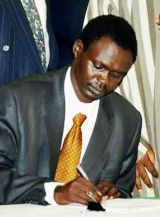Darfur main rebel faction may reject the signed accord
May 9, 2006 (LONDON) — The main Sudan Liberation Movement faction of Minni Menawi urged the Secretary General of the UN to intervene to stop the Implementation of signed accord with the Sudanese government and to investigate the circumstances of the signing.
 In an Arabic language letter addressed to the UN Secretary General Kofi Annan by the political advisor and Foreign Secretary of the rebel group, Ibrahim Ahmed Ibrahim, the SLM said today that the signing of its leader on the document of Darfur Peace agreement was done under unusual conditions.
In an Arabic language letter addressed to the UN Secretary General Kofi Annan by the political advisor and Foreign Secretary of the rebel group, Ibrahim Ahmed Ibrahim, the SLM said today that the signing of its leader on the document of Darfur Peace agreement was done under unusual conditions.
In the letter, the rebel group demands to stop the implementation of the agreement, to revise it, to investigate the conditions of the signing to its leader, and to separate the humanitarian side of the deal from the political one.
Ibrahim said Minni Menawi was subjected to abnormal pressure and was isolated from his delegation for three days during which he didn’t sleep at all. He further said that Menawi before the ceremony of Friday 5 May asked to see some of his people but his request was rejected.
Sources from the SLM said the Nigerian president had put huge pressure on Menawi before the signing.
Ibrahim told Sudan Tribune the signed deal is incomplete because there are many demands that are not answered. “Such a deal could not lead to a true peace” he said.
In a telephone interview Ibrahim said the SLM/A leadership will discuss the 85 pages document during the coming days inside the Sudan, and after a collegial decision will be taken by the movement.
A faction led by his rival, Abdel Wahid al-Nur, and the smaller Justice and Equality Movement rejected the AU brokered accord, expressing concerns security and compensation for war victims had not been guaranteed and because it called for a top presidential adviser from Darfur instead of a vice president.
Nur met with Obasanjo for hours Friday 5 May, delaying the signing ceremony, and then briefly went into the hall where the accord was to be signed.
He left, telling reporters the proposed accord was “a big disaster” because he believed it did not go far enough to guarantee disarmament of the Janjaweed militia linked to the atrocities. Nigerian security forces tried to stop Nur from speaking to reporters, then barred reporters who had followed him out from returning to witness the signing.
This about-face confirms the apprehensions of Deputy Secretary of State Robert Zoellick when he said Friday 5 may Darfur “is going to remain a dangerous place. There is still a lot of distrust and fear.”
(ST)
